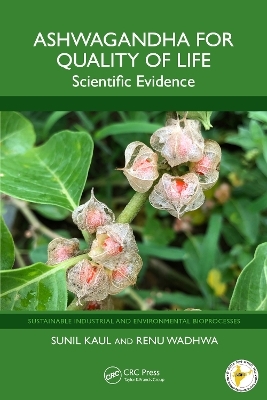
Ashwagandha for Quality of Life
CRC Press (Verlag)
978-1-032-70567-5 (ISBN)
This book offers a comprehensive overview of the scientific evidence supporting the diverse health benefits of Ashwagandha. Each chapter delves into specific aspects, exploring its effects on stress management, cognitive function, physical performance, immune system support, sleep quality, and hormonal balance. Through an evidence-based approach, the text aims to bridge the gap between traditional wisdom and modern scientific understanding, presenting Ashwagandha as a promising herb for enhancing quality of life. Ashwagandha for Quality of Life: Scientific Evidence begins by highlighting the origin and botanical characteristics of Ashwagandha and explores the wide range of its traditional and modern applications. By identifying the main active compounds and their functions, readers gain insight into the herb's potential physiological effects. Further, the book investigates Ashwagandha's potential for preventing and treating COVID-19. The book is intended for general readership, herbalists, naturopaths, alternative medicine practitioners, and life science/medical students and researchers to gain a comprehensive understanding of Ashwagandha's potential in improving health and well-being, while also emphasizing the importance of quality and chemotyping for optimal benefits.
Dr. Sunil Kaul was born and raised in Kalimpong (Darjeeling), India. He received his MPhil and PhD degrees from the University of Delhi, India. After initial post-doctoral training, he was appointed as a researcher at the National Institute of Advanced Industrial Science & Technology (AIST) in Japan, where he has been working for the last 34 years. His main research interest is to understand the molecular mechanism of stress, aging, and cancer. He has merged traditional knowledge with modern technologies like gene silencing and imaging to understand the mechanism of action of Ayurvedic herb, Ashwagandha in particular. With more than 245 research publications in international peer-reviewed journals and several invited lectures internationally, he has been on the editorial board of several scientific journals. He is the Chairman of the Indian Scientists Association in Japan (ISAJ), a registered NPO in Japan. He is the President of KAUL-Tech Co. Ltd., Japan (AIST based Venture) and Research Advisor, ReHeva BioSciences, USA. He has served as a professor at the University of Tsukuba (Japan) and Hanyang University (Korea). He has been honored as a Fellow of the Geriatrics Society of India (FGSI), an Overseas Fellow of the Biotech Research Society of India (FBRSI), a Fellow of the Indian Academy of Neuroscience (FIAN), and a Foreign Fellow of the National Academy of Sciences, India (FNASI). Dr. Renu Wadhwa received her first Ph.D. from Guru Nanak Dev University, India, and her second Ph.D. from the University of Tsukuba, Japan. She did her post-doctoral training at the University of Newcastle Upon Tyne, England, and RIKEN, Japan. She has been working in Japan for the last 33 years and is leading a research team working on the mechanisms of cell proliferation control at the Cellular and Molecular Biotechnology Research Institute (CMB), AIST, Japan. Her main research interest is to understand the molecular mechanism of aging and cancer using normal and cancer cells as a model system. She first cloned a novel member of the hsp70 family protein in 1993 and named it "mortalin". Since then, she has made several original discoveries describing the functional properties of this protein and its role in cancer and age-related diseases. She has more than 270 publications in international peer-reviewed journals with many invited/plenary talks at international conferences. She has been a member of AACR (1997-2000) and president of the 86th annual meeting of the Japanese Tissue Culture Association at AIST Tsukuba, and was a leader of DBT-AIST International Laboratory for Advanced Biomedicine (DAILAB) at AIST, Japan (2013-2021). She has served on the editorial boards of several scientific journals, including the Journal of Gerontology: Biological Sciences and Mechanism of Aging and Development. In honorary academic positions, she has served as an Associate Professor at the University of Tokyo, a professor at Yonsei University College of Medicine (Seoul), and a professor at Hanyang University (Seoul). She is presently a professor at the School of Integrative and Global Majors (SIGMA), University of Tsukuba, Japan. She is a Fellow of the Geriatric Society of India, the Indian Academy of Neurosciences, the Biotech Research Society (India), Fellow of National Academy of Sciences, India.
Preface. About the authors. Chapter 1.What is Ashwagandha? & What does it have? Chapter 2. What is Ashwagandha known for?Longevity and rejuvenation; youthful and refreshed skin; sharp memory, intellect, and cognitive power; freedom from disease; strength of a horse. Chapter 3. What are the major active ingredients of Ashwagandha, and what do they do?Scientific validity. Chapter 4.What are the bioactivities of Ashwagandha? Extracts, experiments, and evidence. Chapter 5. Anticancer ingredients and their mechanism of action. Chapter 6. Does Ashwagandha have any effect on the prevention and treatment of COVID-19?Chapter 7. What next? Signature components and their corresponding activities as well as the importance of quality and chemotyping. Chapter 8 What evidence? Collection of true stories and testimonials about the effectiveness of Ashwagandha. 9.Final Thoughts. 10. Selected readings. 11. Index.
| Erscheinungsdatum | 22.08.2024 |
|---|---|
| Reihe/Serie | Sustainable Industrial and Environmental Bioprocesses |
| Zusatzinfo | 36 Line drawings, color; 1 Line drawings, black and white; 15 Halftones, color; 51 Illustrations, color; 1 Illustrations, black and white |
| Verlagsort | London |
| Sprache | englisch |
| Maße | 156 x 234 mm |
| Gewicht | 381 g |
| Themenwelt | Sachbuch/Ratgeber ► Gesundheit / Leben / Psychologie ► Alternative Heilverfahren |
| Medizin / Pharmazie ► Allgemeines / Lexika | |
| Medizin / Pharmazie ► Naturheilkunde ► Phytotherapie | |
| Studium ► Querschnittsbereiche ► Infektiologie / Immunologie | |
| Naturwissenschaften ► Biologie | |
| Technik | |
| ISBN-10 | 1-032-70567-1 / 1032705671 |
| ISBN-13 | 978-1-032-70567-5 / 9781032705675 |
| Zustand | Neuware |
| Informationen gemäß Produktsicherheitsverordnung (GPSR) | |
| Haben Sie eine Frage zum Produkt? |
aus dem Bereich


